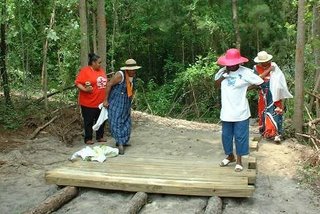 Before pavement and concrete, roads were constructed of wooden planks. The longest plank road in North Carolina extended from Fayetteville to Winston-Salem.
Before pavement and concrete, roads were constructed of wooden planks. The longest plank road in North Carolina extended from Fayetteville to Winston-Salem.Roads were typically built with slave labor. After workers cleared the land, they laid down long timbers - and then topped them planks, filling in the gaps with sand. Edges varied in length for a reason, making it easier to push a carriage wheel that had run off the road back up onto the planks.
A portion of a plank road can be seen at the Sandhills Heritage Center on Chapel Hill Road in Spring Lake, North Carolina. Each year, the facility offers the public re-enactments of some elements of the slave period - such as worship. Beginning in May, a farmers market will feature locally grown fruits and vegetables, handmade craftwork and local entertainers.
For more information, contact the Fayetteville Convention and Visitors Bureau at http://www.visitfayettevillenc.com.
No comments:
Post a Comment